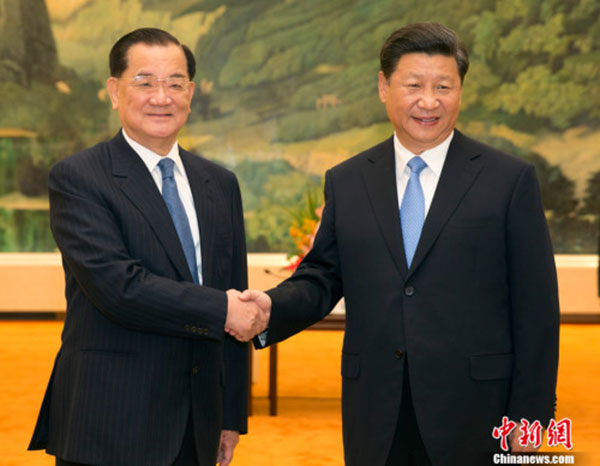Why US is supporting Xi-Ma meeting
Updated: 2015-11-06 08:02
By SHIH CHIH-YU(China Daily)
|
||||||||
 |
|
Xi Jinping, general secretary of the Communist Party of China (CPC) Central Committee meets Lien Chan, former chairman of the Kuomintang (KMT) in Beijing on Sept 1, 2015. [Photo/Agencies] |
A rare occasion on which Xi Jinping, Barack Obama and Ma Ying-jeou agree is about to take place in Singapore, as the meeting between Xi and Ma is intended to balance the growing "independence" sentiment in Taiwan, something that is bothering all three political leaders; for different reasons.
The popular impression that Xi is trying to help Ma and the ruling Kuomintang to regroup in a battle for Taiwan leadership election in 2016 is problematic. Most actually believe that the Kuomintang is destined to lose. Since Ma's extremely weak leadership cannot bring a certain result, how can Xi base his brave decision to meet with Ma on uncertainty? Rather, the opposite consideration is more likely, that the "pro-independence" Tsai Ing-wen is going to win by a landslide at the polls, so there is need to cope with her determination to politically estrange the mainland. This matches Ma's wish to control the potential danger of Tsai inciting her constituency into a drastic demand for legalizing "independence".
Ma wishes nothing more than the continuation of the status quo even if, as seems likely, Tsai comes to power next May. The shared aversion of Ma and Xi to Taiwan "independence" aside, Ma prefers to stay with Washington, whose suspicion toward either provocative independence or realignment across the Taiwan Straits cannot be overestimated. This brings us to the key question-Why has Washington appeared more enthusiastic than expected toward the cross-Straits meeting?
Three days before the announcement of the summit by Ma's office, Washington had already offered its approval. Retired US officials who used to work on cross-Straits issues have one after another expressed their pleasant surprise at the announcement. Hasty columnists as well as underdog campaigners speculate a change of mood in the United States, seeing it as now ready to choose the Kuomintang over Tsai's Democratic Progressive Party. But the real rationale behind Washington's support of the meeting coincides with that of Beijing, namely, to balance the growing "pro-independence" atmosphere in Taiwan. This is prerequisite to the realization that some check on Taiwan "independence" is wise.
Washington is committed to a neither-nor policy regarding unification and independence. Since "pro-independence" sentiment is rising and will probably win big in the election, Washington has to rescue the credibility of the other side. This is important for Washington because once the "pro-independence" mood gets too excited the situation could develop to a level that Beijing can no longer tolerate. This would mean the involvement of Washington in an unnecessary confrontation at a point not of its own choosing. In short, the rationale for Washington to support the meeting is to bring stability to the cross-Straits situation after those in favor of "independence" come to power.
In light of the fact Tsai has remained coy about her intentions to honor the status quo, to which she avoids any mention, her intention to shun the one-China principle is more than apparent. This would change the parameters of the cross-Straits relationship premised on the 1992 Consensus, which indirectly but specifically sticks to the one-China principle. Therefore, the meeting will reinforce the current parameter of the one-China principle so that the status quo is crystal clear, even to Tsai, whose rhetorical commitment will thus no longer be required.
Indirectly, therefore, Washington is assisting Tsai in stabilizing cross-Straits relationship after her expected victory. For Washington, the meeting checks Taiwan independence only in an instrumental sense. It mainly serves to preempt Beijing from forcing Tsai into corner and then engulfing Washington.
The author is a professor of political science at National Taiwan University.
- Global health entering new era: WHO chief
- Brazil's planning minister steps aside after recordings revelation
- Vietnam, US adopt joint statement on advancing comprehensive partnership
- European border closures 'inhumane': UN refugee agency
- Japan's foreign minister calls A-bombings extremely regrettable
- Fukushima impact unprecedented for oceans: US expert

 Stars of Lijiang River: Elderly brothers with white beards
Stars of Lijiang River: Elderly brothers with white beards
 Wealthy Chinese children paying money to learn British manners
Wealthy Chinese children paying money to learn British manners
 Military-style wedding: Fighter jets, grooms in dashing uniforms
Military-style wedding: Fighter jets, grooms in dashing uniforms
 Striking photos around the world: May 16 - May 22
Striking photos around the world: May 16 - May 22
 Robots help elderly in nursing home in east China
Robots help elderly in nursing home in east China
 Hanging in the air: Chongqing holds rescue drill
Hanging in the air: Chongqing holds rescue drill
 2.1-ton tofu finishes in two hours in central China
2.1-ton tofu finishes in two hours in central China
 Six things you may not know about Grain Buds
Six things you may not know about Grain Buds
Most Viewed
Editor's Picks

|

|

|

|

|

|
Today's Top News
Liang avoids jail in shooting death
China's finance minister addresses ratings downgrade
Duke alumni visit Chinese Embassy
Marriott unlikely to top Anbang offer for Starwood: Observers
Chinese biopharma debuts on Nasdaq
What ends Jeb Bush's White House hopes
Investigation for Nicolas's campaign
Will US-ASEAN meeting be good for region?
US Weekly

|

|







